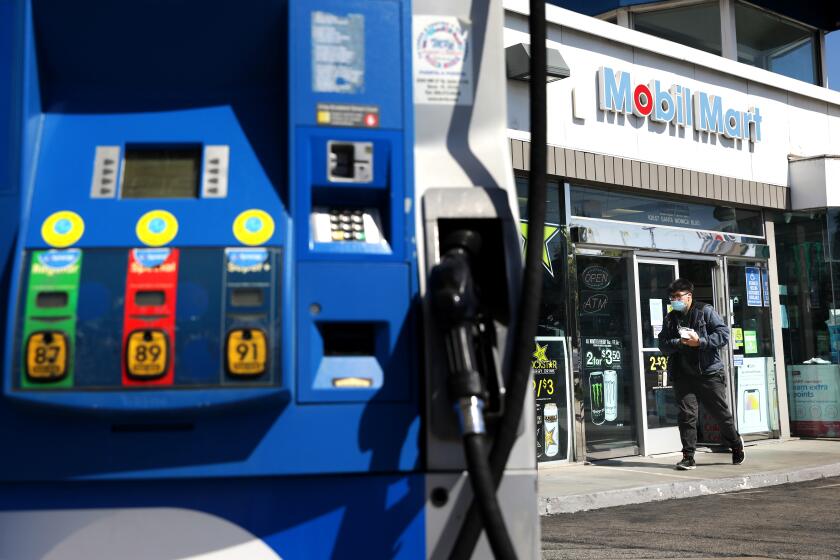Editorial: Five reasons to keep the federal tax credit for electric vehicles

- Share via
President-elect Donald Trump‘s transition team is planning to eliminate a $7,500 electric vehicle tax credit that helps consumers afford clean cars while supporting the U.S. auto industry.
Combined with his pledge to roll back vehicle emissions standards that require automakers to sell more electric vehicles, ending the credit would be a big step backward for clean air, the climate, consumers, manufacturing employment and the U.S. economy.
It’s ineffective at shaping behavior, and it primarily benefits the wealthy while needlessly adding to the deficit. EVs aren’t even good at curbing climate change, and the credit could be stifling better alternatives.
Here are five reasons why the EV tax credit is worth keeping, and why scrapping it would be a counterproductive mistake.
Ending the EV tax credit will raise consumer costs.
EVs are growing in popularity worldwide, but most Americans need help affording plug-in vehicles because they still cost more, on average, than their gas-fueled counterparts. That’s the whole idea behind the tax credit, which allows consumers to claim up to $7,500 to offset the purchase price.
The policy is working, making EVs more affordable and competitive with gas-fueled models, especially accounting for the many thousands of dollars EV owners save over the lifetime of their vehicles from lower fuel and maintenance costs.
Gov. Gavin Newsom and other leaders must mount a strong offense as well as robust defense against attacks on environmental protection and climate change mitigation.
President Biden expanded the program by adding a $4,000 tax credit for the purchase of a used electric vehicle. Since Jan. 1, buyers have also been able to claim the credit at the time of sale and use it toward their purchase instead of waiting until they file their taxes. Consumers saved over $600 million in just the first three months of the year, an average of $6,900 per vehicle, according to the Treasury Department. Electric cars shouldn’t be a luxury available only to the wealthy. Keeping the tax credit in place will help these clean, low-maintenance vehicles get within reach of more American families.
Tax incentives are a bipartisan solution.
Presidents of both parties have for nearly two decades supported federal incentives for cleaner vehicles. The tax credit was established in 2005 under George W. Bush as a $3,400 incentive to help offset the purchase of a fuel-efficient hybrid vehicle. In 2008 Bush signed legislation that applied it to plug-in vehicles and expanded the credit to up to $7,500.
The credit continued under President Obama and President Trump’s first term, during which it grew in popularity every year, saving consumers and businesses about $5 billion. The credit got a major expansion with the Inflation Reduction Act in 2022, and continuing it will save consumers money while helping support good-paying American auto industry jobs.
The EV credit supports American jobs.
The auto industry is a cornerstone of the U.S. economy, providing more than 1 million jobs, and its strength is increasingly dependent on its success in making the global transition from its gas-fueled past to an electric-powered future.
The U.S. auto industry wants to keep the consumer EV tax credit, and automakers don’t want the incoming Trump administration to scrap federal rules requiring them to sell more EVs. They have understandably cited the need for stability and predictability for the industry, as well as a desire to remain competitive and recoup hundreds of billions of investment in the transition to EVs.
All California homes need temperature standards to prevent heat wave deaths, not just newly built ones.
Ending the EV tax credit would also hurt American manufacturing. When the credit was expanded under the Inflation Reduction Act, new rules were also added to restrict eligibility to vehicles that are assembled in North America and meet other restrictions on the sourcing of battery parts and crucial minerals. The aim was to encourage domestic production and reduce the supply chain’s dependence on China. This is no time to halt policies that give American workers a shot at a better future.
Ending the credit hurts America’s competitiveness.
Electric vehicles are the future, and that is a reality U.S. automakers are planning for and making huge investments in, including more than $100 billion in new electric vehicle factories and battery plants. But China and other competitors are pouring far more resources into that transition. Automakers, including Ford and General Motors, have set clear goals to phase out gas-fueled cars and transition to all-electric fleets. But ending the policies that support that transition will only cede ground to China, Europe and other rivals.
Big Oil wants you to think that California’s high gas prices are because of state climate policies. But the oil industry is actually responsible for much of it.
Trump’s richest supporter and associate, Elon Musk, has voiced support for ending the EV tax credits, despite owning Tesla, because while it might hurt his business, it would hurt his competitors more. But our nation’s economic future depends on a healthy, robust market for American-made EVs, with diverse offerings at affordable price points. It would be unwise to undermine that.
A less competitive U.S. electric vehicle sector will also make the country more dependent on foreign oil. Oil companies, which supported Trump’s reelection (he advanced a pro-fossil-fuel agenda during his first term), would be the primary beneficiaries of rolling back pro-EV policies, keeping consumers tied to Big Oil and captive to their volatile gas prices.
We need EVs to fight global warming.
The most important reason for keeping the tax credit, of course, is that it helps the transition to pollution-free vehicles. Transportation is the nation’s largest source of planet-warming pollution, and we can’t effectively fight climate change without slashing emissions that are causing storms, wildfires, heat waves and droughts to worsen.
Even Trump — who has dismissed global warming as a “hoax” and attacked EVs by stoking baseless consumer fears during his campaign — should be able to see that the future is electric and that American businesses, consumers and workers can either stake out a place in that future or be left behind.
More to Read
A cure for the common opinion
Get thought-provoking perspectives with our weekly newsletter.
You may occasionally receive promotional content from the Los Angeles Times.














